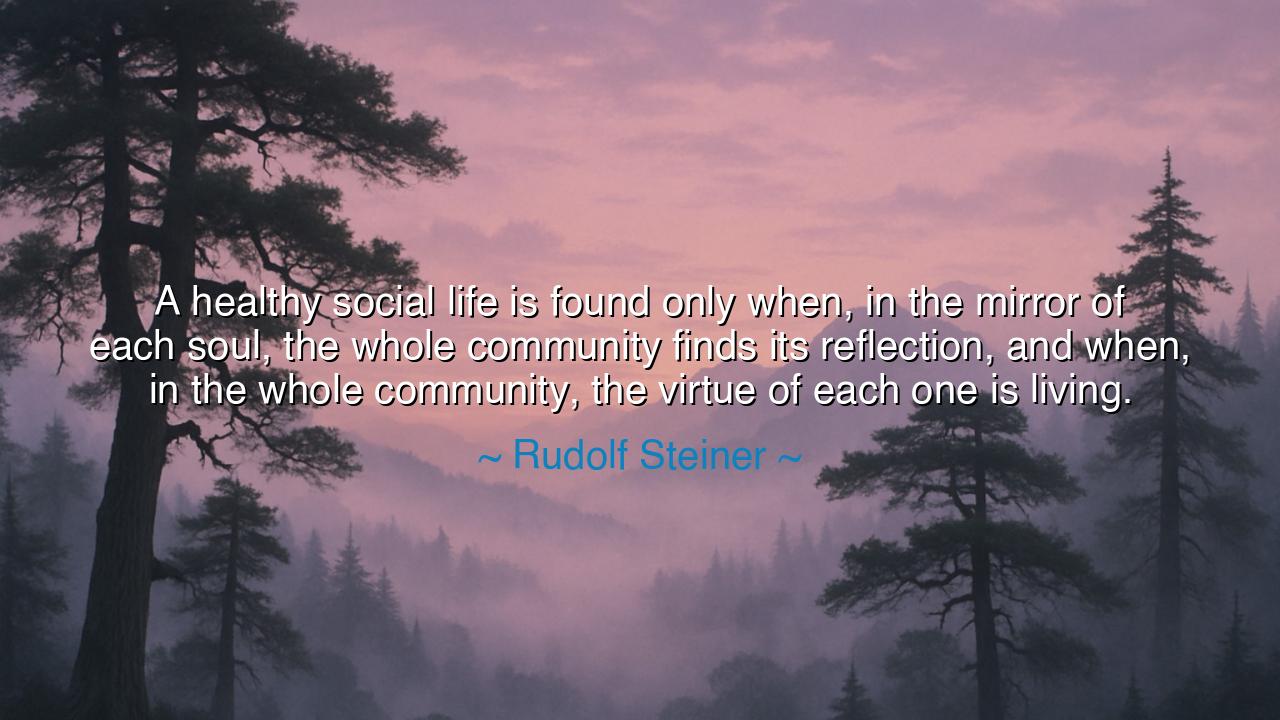
A healthy social life is found only when, in the mirror of each
A healthy social life is found only when, in the mirror of each soul, the whole community finds its reflection, and when, in the whole community, the virtue of each one is living.






Hear now, O seekers of wisdom, the profound teachings of Rudolf Steiner, who speaks to the essence of community and the interconnection between the individual and the whole. He says, "A healthy social life is found only when, in the mirror of each soul, the whole community finds its reflection, and when, in the whole community, the virtue of each one is living." These words ring with the ancient truth that the individual is not separate from the community, but woven into its fabric, like threads in the same tapestry. The health of a society is not determined by its wealth or its power, but by the vitality and virtue of its members, each of whom reflects and contributes to the collective whole.
In times long past, the ancient Greeks understood this truth well. They believed that a city-state, such as Athens, could only flourish when its citizens were not just subjects but active participants in the life of the community. Each citizen was responsible for the well-being of the whole, and the moral and spiritual health of the individual was seen as inseparable from that of the state. Socrates himself, in his dialogue with the youth of Athens, argued that a life of virtue—the pursuit of wisdom, justice, and moral integrity—was not only beneficial to the individual but was essential for the thriving of the entire polis. The individual, in this sense, was both reflective of the community and a source of its strength.
This interconnectedness is also seen in the teachings of Confucius, who spoke of the harmony between the individual and the society. He taught that for society to be in balance, each person must cultivate their virtues—benevolence, righteousness, proper conduct, and wisdom—and apply them not only in personal life but in their interactions with others. The strength of society lay in the collective virtue of its people, just as the prosperity of the individual was bound to their contributions to the whole. In this, Confucius emphasized the reflective nature of the soul, understanding that the well-being of one’s society is a reflection of one’s moral efforts.
In more recent times, the story of Mahatma Gandhi offers a powerful example of how the virtues of the individual shape the broader community. Gandhi’s commitment to nonviolence, truth, and self-discipline was not just for his own spiritual growth, but to uplift the spirit of the entire Indian people. Gandhi believed that a healthy social life could only emerge when each person aligned their actions with higher principles, and he led by example, showing that a single virtue—the commitment to truth and justice—could transform a nation. His leadership revealed the deep truth in Steiner’s words: that community is not a collection of isolated individuals, but a dynamic entity where the soul of each person shapes the soul of the whole.
Steiner’s insight is a call to us all to reflect on the role we play in the collective well-being. In our own time, society often encourages a disconnection between the individual and the greater good, telling us to pursue our self-interest at the expense of the community. But Steiner’s wisdom reminds us that the true health of society lies in the reciprocal relationship between the individual and the whole. Each person’s virtue, whether it be kindness, integrity, or courage, is a mirror of the larger social fabric. A society will only thrive when each of its members contributes their virtue to the collective, and when the collective energy of that community nurtures the growth and development of the individual.
The lesson, then, is clear, O seekers. The health of your community is intertwined with the health of your own soul. Virtue cannot be isolated; it must be lived and expressed in the world around you. You are not merely an individual separated from the whole, but a vital part of a living, breathing entity. The action you take in your life—your kindness, your work, your relationships—ripples outward, affecting the entire community. Thus, you must develop within yourself those virtues that will benefit not only your own soul but the collective soul of your community.
So, let your actions reflect the truth of the whole. Strive to cultivate virtue in all your dealings, understanding that when you contribute to the greater good, you are also nourishing your own spirit. A healthy social life begins with the conscious choice to engage with others in a way that reflects the best within you, and to inspire others to do the same. In this way, you will contribute to a society where each soul finds its reflection in the whole, and the virtue of each individual becomes the living force that sustains the community.






AAdministratorAdministrator
Welcome, honored guests. Please leave a comment, we will respond soon